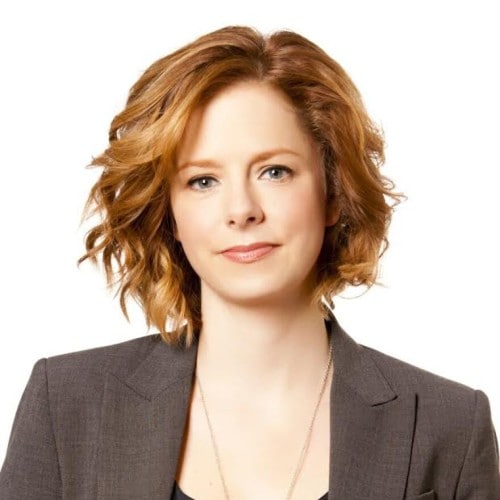{{item.title}}
{{item.text}}

{{item.text}}
Take on Tomorrow, the award-winning podcast from our management publication strategy+business, brings you Episode 5: “Can corporate reporting deliver change?”
The reporting of corporate data matters—and not just to accountants and stock analysts. Investors, employees, and customers want to know how companies are dealing with climate change, building more diverse workforces, and complying with crucial regulations. Stakeholders are demanding information that is more detailed, more readily measured, and more easily verified. In this episode, we’ll hear how reporting can build trust and why it needs to be a key item on leaders’ agendas.
Lizzie O’Leary
Podcaster and journalist
Ayesha Hazarika
Columnist and former senior political advisor
Emmanuel Faber
Chair, International Sustainability Standards Board
Eelco van der Enden
CEO, Global Reporting Initiative
Nadja Picard
Global Reporting Leader, PwC
2023 Shorty award winner for "Best Branded Podcast" series
2023 Webby award nominee for "Best Podcast" series
{{item.text}}

{{item.text}}
As reinvention pressure rises, CEOs need to rewire their decision-making.
Sharp, actionable insights curated to help global leaders build trust and deliver sustained outcomes. Explore our latest content on the global issues affecting organisations today from ESG to value creation, technology and cyber to workforce transformation.
Nadja Picard: Everybody understands a balance sheet, profit and loss: it’s all organized in the same way. Financial reporting as a basis for decision-making really, really works these days. That’s the place we need to get to with sustainability information as well.
Lizzie O’Leary: From PwC’s management publication, strategy and business, this is Take on Tomorrow, the podcast that brings together experts from around the globe to figure out what business could and should be doing to tackle some of the biggest issues facing the world. I’m Lizzie O’Leary, a journalist in New York.
Ayesha Hazarika: And I’m Ayesha Hazarika, columnist and former senior political advisor based in London.
Lizzie: This week, we’re talking about corporate reporting. Now before you say, “How does that impact me?” we want to tell you it does matter—and not just if you’re an accountant or investor. Reporting on an ever-increasing range of topics isn’t just a requirement for companies. It’s a driver for real change: from better understanding how a company creates value for its shareholders to its impact on the environment and action on social inequality and diversity.
Ayesha: And if companies don’t take action, there could be a price to pay. Reporting isn’t just an output. It’s an input that informs decision-making and the crafting of strategy. Today, we’re talking about what’s being done to make sure stakeholders—from investors, to employees, to customers, to policymakers—have the information they need. Because change is coming.
Lizzie: In a moment, we’ll listen to a panel discussion recorded live on stage at the World Economic Forum’s 2022 annual meeting in Davos. It brought together some of the leaders in global efforts to improve the trustworthiness of corporate disclosures.
Ayesha: But first, we are joined by Nadja Picard, PwC’s global reporting leader. Nadja, welcome to the show.
Nadja: Thank you for having me. It’s an exciting time to be talking about these issues.
Ayesha: It certainly is. And we’re talking about reporting today and, in particular, about the changes that we are expecting in requirements. Now I get why this matters to people whose job it is to file these reports, Nadja, but why should anyone else care?
Nadja: Reporting ultimately is about decision-making, right? You’re issuing information to people who then are taking decisions based on this information. For example, investors are taking decisions on their investments, into a company, based on financial reporting, but their interest in sustainability information is ever so increasing. Employees look actually at corporate disclosures to decide who they want to work for. And customers look at corporate disclosures, but also at product disclosures, to decide what they want to buy. So reporting is about decision-making, and that’s why it’s important.
Lizzie: Now, we have an opportunity to bring our listeners into the room, to listen to part of the conversation at the World Economic Forum. The panel was called Driving Change: The Global Alignment of Reporting Standards. You were on that panel, Nadja. And so was Emmanuel Faber. He’s the chair of the International Sustainability Standards Board, or ISSB, formed around COP26 [the 2021 United Nations Climate Change Conference, also referred to as the Conference of Parties] in Glasgow. Their goal is to develop a global baseline for sustainability disclosures. Let’s hear him speaking as part of the panel now.
Emmanuel Faber: The International Sustainability Standards Board exists to provide a language that corporate CEOs and investors can use to drive their discussions about what matters beyond accounting, on top of accounting. And that’s climate that we are discussing here, as well, but that’s the whole ESG [environmental, social, and governance] aspect. The one thing I have to say immediately is that we start from the materiality perspective, which is a financial materiality. So, what matters for investors, capital providers, in the way they allocate capital and the price at which they allocate that capital, in assessing the enterprise value of those companies, whether they are private, actually, or listed.
And we expect our disclosures to help support a discussion about the short-, the mid-, and the long-term resilience opportunities, risks that are there, the strategy, and also the governance of those very important material aspects.
We are clear that our remit is shareholder capitalism. But we believe that capital markets drive economies and, therefore, economies drive the way we live, which will have maybe an unintended consequence on the overall way economies serve the world better at the end of the day.
We want that global baseline to be truly meeting the needs of sophisticated largest investors, largest companies, and yet being inclusive of the smaller ones. So it’s all the question of proportionality, of interoperability, of education, and capacity building that I’m happy to discuss—but that’s an entirely, very white page that we are trying to write together here.
Lizzie: I want to pick up on an idea that Emmanuel referenced: materiality. Nadja, there are differing concepts of materiality that are extremely important here. I wonder if you could explain them.
Nadja: There are three kinds of materiality. The one is the investor or financial materiality that Emmanuel referred to. And that is commonly referred to as the sustainability topics that affect a company, that affect the profitability of a company. So it’s an outside-in view. Quick example is, are there climate-related issues, like floods, that would require me to move my operations, my buildings, my real estate, from an area that is prone to flooding? The second type of materiality is the reverse view, the inside-out view. So, what impact do my corporate actions have on society and the planet? Am I using too much water in a certain area that then poses a problem to the communities that live in that area? Do I emit a lot of CO2? Do I cut down forests that then reduce biodiversity? If you combine the two, it’s called double materiality. So, looking after issues from both sides and actually providing disclosures around the impact on me as a business but also on the impacts that I as a business have on society and the planet.
Ayesha: And another panelist was Eelco van der Enden. He’s the CEO of the GRI—the Global Reporting Initiative. And the GRI has put forth a voluntary set of standards to allow for companies to report on a huge number of areas—from emissions, to waste, to labour and diversity, as you’ve just been discussing. And Eelco is also a former partner with PwC Netherlands. Thousands of large multinationals have signed up to using them. Here he is explaining what the GRI is all about.
Eelco Van Der Enden: If you look at what our role is compared to, for example, financial reporting, we are what we call inside out.
So, the effects businesses have when they try to achieve their strategic objectives—on the environment and on socioeconomic cohesion and socioeconomic topics. Whereas when it comes to value creation, it is outside in, what the effects are of climate change, social disruption, on the value and future cash flows of organizations.
But we believe that they are in fact two sides of the same coin. Equally important. Why? Because there is a tremendous interest in both aspects, also by investors.
So it is a myth to say that investors are only interested in yields and the financial aspects and financial risk, if you also look at some of the things we currently see where large investors put pressure upon organizations to start report beyond financial topics only.
So what we try to do with Emmanuel, with the ISSB, is to start to align these two topics, these two views. And I think, indeed, that what we are aiming for is a global baseline for these standards.
Lizzie: The GRI and ISSB are working together and signed a memorandum of understanding in March of 2022. So now they’re collaborating on refining standards. Nadja, can you explain just how big the gap is that they’re trying to bridge and what progress they have made?
Nadja: I think that memorandum of understanding is really crucial to solve the potential differences in viewpoints that we have across the globe, right? An Anglo-Saxon view, a US view, a UK view, a Central European view, Asian view, South American view. If they do a good job in really defining how to think about it and making that practicable for preparers and users, easy to understand, putting the two disclosures together and focusing on what really matters for their stakeholders, then I don’t think it’s that difficult to build the comprehensive global baseline, including both sides of the materiality viewpoints.
Lizzie: One of the criticisms, Nadja, of sustainability reporting is that when we think about ESG criteria—environmental, social, and governance issues—that they’re simply too disparate to develop a single set of standards. I wonder, is the idea of one set of standards just wishful thinking?
Nadja: No, I don’t think so. What we’re seeing now is obviously an environment where too many standards, too many reporting requirements, disparate, it’s just too complex to handle. But we do have an opportunity here to settle on some of the most important issues. I think we’re extremely close on settling down on climate disclosures. And I’m not letting go on the real possibility of aligned standards being produced. Because whenever I talk to regulators, to investors, when I talk to companies, the preparers, but also organizations like the WEF-IBC [the World Economic Forum’s International Business Council], the CEOs, they all are after this very-much-aligned set of disclosures.
And, if we switch to the other side of the system, really the investors, how can you really make sound investment decisions if you need to spend time on finding data, on interpreting data, on interpreting disclosures? We’re almost there in financial reporting, right? Everybody understands a balance sheet, profit and loss: it’s all organized in the same way. On a global scale, the differences are so minimal and so well understood that financial reporting as a basis for decision-making really, really works these days. That’s the place we need to get to with sustainability information as well.
Ayesha: Nadja, something I’m struck by, a lot of progress towards sustainability objectives has been the result of voluntary action by companies. Do you think, is this an issue that’s prominent in investors’ thinking, something they’re really genuinely expressing an interest in doing?
Nadja: Yeah, absolutely. Look, we’ve done a survey, and we found that 79% of investors are really looking at ESG risks and opportunities as they pertain to a company. So it is at the core of what investors are looking for ultimately. That’s why investors are really interested in understanding how the company, how management thinks about all these topics and issues. What’s the threat and what are the opportunities that are currently, directly, knowingly affecting my business, my strategic planning? But also, how am I using the resources as a company? What impact do I have?
Lizzie: A lot of discussion around sustainability focuses on the environment—we’re talking about the E of ESG. But to expand into the S and the G, we’re going to play a little sound from Eelco again.
Eelco: Some topics are more easy to understand when it comes to materiality and double materiality than others. So, when we go to climate and carbon, everyone can understand carbon and climate things.
But it gets more difficult when we go to the S and the G in ESG. And sometimes we forget about that one. The S is about human rights—equality, equal pay, child labour, safe workplace, indigenous people.
How would you typically value that? But it is important, and it is material to many organizations, because we live in a world with labour shortage, and we see that many, especially the younger people on the labour market, they take a serious look at the sustainability reports when it comes to these topics.
Lizzie: Nadja, how much attention would you say companies are paying to social and governance questions, and how does one go about quantifying those issues?
Nadja: I think that is a very good example of a vastly different answer had you asked me that question five years ago. We’ve done a recent analysis on 120 global businesses, and that shows that diversity and inclusion data is the most reported-on sustainability topic right after carbon emissions. Companies don’t do that normally out of the goodness of their heart, but they do that because it is a business issue for them.
Making sure that they are also as a company recognized as a good employer is absolutely crucial for companies, right?
So I don’t think that companies are underplaying the social side. And as the pressure on, for example, climate-related issues or other environmental issues on companies and the pressure to possibly change their business operations and change the strategies in the long term becomes more evident, they’re even more challenged to explain to their very own employees what that will mean for them. How will their possible transformation affect the employee base, and what will the company do to help the currently employed employees to join them in that transition to a slightly different business? They need to explain themselves on what that means for the communities that they operate in.
Ayesha: Hmm. Now, both Emmanuel and Eelco talk about a global baseline, and I’m curious to know how different parts of the world see some of these key issues. I want to play part of an answer Emmanuel gave to a question during the panel. He’s just been asked about the S part of ESG—social issues—and what the road map might be for improving them.
Emmanuel: Ah, a couple of things here, first of all. I think, and I’ll have to make it sure, that there’s a good chance that the agenda can be informed by the ILO principles.
Ayesha: Emmanuel is referring there to the International Labour Organization, a UN agency that promotes workers’ rights. The ILO principles treat issues including collective bargaining, forced labour, and discrimination.
Emmanuel: They’ve become more of a consensus now than they were even two years ago or one year ago, including by jurisdictions that you might not expect on that. It’s a good starting point, I think. Second, I think that our work is going to be on that front to propose building blocks. In other words, the idea is not to come and say, “You have a full menu, and you need to take it all.” You will have à la carte, but when you choose à la carte, that’s the same recipe in the kitchen, exactly the same ingredients, the same recipe, et cetera, et cetera.
And so, for instance, D&I [diversity and inclusion], there is probably no reason fundamentally, if you breathe and sit back quietly for a minute, there’s no reason why in the US, in Asia, and in Europe, it would be different. Whether D&I is going to be material in one or the other can be a discussion. But if you choose and pick D&I, everyone is going to speak the same language.
So that’s the sort of the building block approach or à la carte approach. The same would go for increasing diversities, same could go for, you know, workers’ rights, gender, pay, equity, et cetera et cetera.
Ayesha: An interesting thought there, how diversity and inclusion differs from region to region. How much of a challenge is it to get countries in different parts of the world, with different political systems, different laws, different values, different visions, to abide by the same set of standards?
Nadja: We are all after comparability, right? Some of the challenge is to really define the baseline requirements. We’re pretty close to that on climate, on net zero. There’s general overall agreement that this is the north star, and companies should be reporting against their progress towards that goal. Forced labour is, I think, another topic that is quite easy to agree upon. So the baseline needs to be something that is really commonly understood.
If there is then particularly regulatory overlay, for example, EU taxonomy disclosures that are required, or particular regulation in countries that require public reporting against it, so be it. But I think we need to be quite deliberate in not wanting too many disclosures, too specific, that responds to everybody’s needs and requirements, to really build that global system.
Ayesha: How do you think people can get caught out if they don’t fully disclose the information they should be doing, or they try and wash the information? What are the penalties? What are some of the sanctions that perhaps regulators or even lawmakers should be looking at? What are your thoughts on that, Nadja?
Nadja: There’s a lot of NGOs and a really attentive public these days that really unpick corporate behavior. The knowledge around sourcing raw materials and what that really does to all sorts of products is increasing every day. The biggest risk in my view, besides doing something that is unlawful, right, the bigger risk is a reputational risk, the risk of being known as a company that says it’s doing good, but it’s actually not. That will harm your ability to recruit, that will harm your ability to sell your product. Because a lot of the sustainability disclosures and issues are supply chain issues. So even if you don’t sell product to your end consumer, but to, you sell product to other corporates that use your product in their production process, they might not want to be associated with you, yeah? So you might lose out on the customer side. You might lose out on the employee side, and you certainly will lose out on the investor side, because people don’t want to invest into a company that is not straightforward, and that says it does good, but doesn’t. So that system of de facto sanctions is becoming more and more built-out and obvious.
Lizzie: I wonder how you think about the urgency of how all of this unfolds—how quickly you think that a broader set of guidelines need to come into play to, I guess, put a firmer or more, maybe, credible stamp on company reporting.
Nadja: So, implementing a new set of reporting standards might take not weeks, not months, but years for companies, right?
The most imminent set of requirements that are known right now is, on the one hand, the SEC [the US Securities and Exchange Commission]-proposed rules around climate reporting, with possible implementation already for 2023. In Europe, we know that the CSRD [the EU’s Corporate Sustainability Reporting Directive], which is now agreed upon in an elaborate political process, requires companies to report on 2024 in 2025. That is very imminent when it comes to corporate reporting. As companies are struggling with issues in the supply chain, due to the pandemic, a war that is going on in Europe, the attention they can put on implementing a very pervasive set of reporting requirements is really challenged.
I think we’re very close to a quite elaborate pervasive system of disclosures, but to see it fully implemented, that might take another two, three, four years. And let’s not forget that the ISSB standards are not mandatorily applicable for anybody. Once they’re finalized, they still need to be adopted by regulators and territories. So that again might lead to a bit of a delay in implementation of a full global system of comparable sustainability disclosures.
Lizzie: What would you see as a marker of real progress?
Nadja: A marker of real progress will be the implementation of the CSRD and pervasive climate-related disclosures around the globe. We’re there, right? The SEC is moving forward. In the UK, there’s mandatory TCFD—it’s another climate-related reporting standard [the UN’s Task Force on Climate-Related Financial Disclosures]—that is moving forward. We’re seeing more and more territories, really requiring particularly climate-related disclosures. So we will be building from there. But again, a whole continent, a whole European Union moving onto one reporting standard in the next four years, that will be significant progress.
Lizzie: Nadja. Thank you so much for walking us through this topic and sharing your expertise and the complexity of it all with us.
Nadja: You’re very welcome. Thank you for having me.
Lizzie: Listening to that, Ayesha, one of the things that was most illuminating for me was how something that could sound arcane like corporate reporting standards, really lays out, kind of, a vision for real change that affects, you know, the environment, people’s lives, and maybe a different way of companies doing business.
Ayesha: Yeah. And I think, if we’re in a world now where we do care about stakeholder capitalism, this is absolutely critical to those stakeholders. And they need clarity, they need certainty, they need confidence—and they need transparency. And it is interesting that from her perspective, this is something which, if companies don’t get involved with, there will be a cost, certainly a reputation cost. And this is something that investors really care about as well. So I found it fascinating.
Lizzie: You’re absolutely right, Ayesha.
That’s it for this episode. Join us next week, when we’ll be asking: What’s the point of stakeholder capitalism?
Guest: So that PR-led strategy, where it’s just talk and there’s no action. Really, you’re getting all the downsides of the culture war and none of the upsides of actually making your business better.
Ayesha: Take on Tomorrow is brought to you by PwC’s strategy and business. PwC refers to the PwC network and/or one or more of its member firms, each of which is a separate legal entity.
© 2022 PwC. All rights reserved. PwC refers to the PwC network and/or one or more of its member firms, each of which is a separate legal entity. Please see www.pwc.com/structure for further details.
This content is for general information purposes only, and should not be used as a substitute for consultation with professional advisors.









